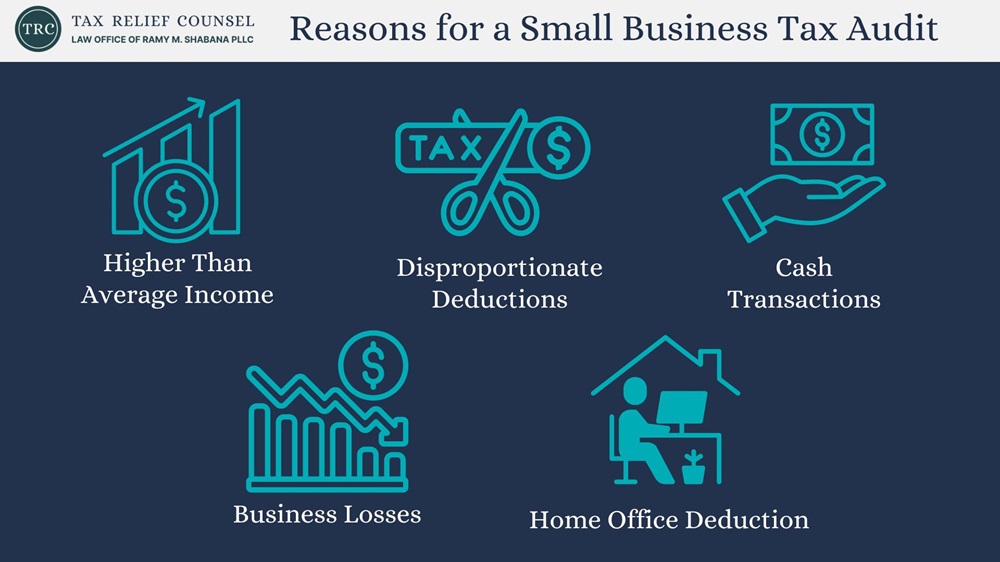Table of Contents
Just the thought of an IRS audit is enough to cause stress. But the good news is that most audits are avoidable if you know what to watch out for or if you have the help of an IRS audit attorney.
By avoiding some common mistakes, you can lower your chances of getting flagged and keep the Internal Revenue Service out of your hair.
Let’s dive into what you need to do to stay on the safe side of a small business tax audit.
Why Your Small Business Might Be Audited

While the IRS only audits a small percentage of small businesses, certain factors can increase your chances of being selected, including:
- Higher than average income: Reporting significantly more income than other businesses in your industry.
- Disproportionate deductions: Claiming excessive or questionable deductions that do not align with your reported income.
- Cash transactions: Operating in industries that handle a lot of cash, such as restaurants or salons.
- Business losses: Repeatedly claiming business losses year after year.
- Home office deduction: Improper home office deductions can raise red flags.
If you’re not sure whether certain issues might trigger an audit, contact a tax attorney.
10 Ways to Avoid a Small Business Audit
Here’s what you need to know about mitigating the aforementioned factors and lowering your chances of an audit.
1. Keep Accurate and Comprehensive Business Records
Maintaining detailed, accurate business records is crucial. After all, you don’t want to be audited and not have receipts.
IRS agents often review business records for accuracy and consistency, so it’s important to keep all:
- Receipts and invoices
- Bank statements
- Payroll records
- Contracts with independent contractors
Having these documents also helps ensure that your business tax returns are correct and comprehensively support any deductions or expenses you claim.
2. Avoid Disproportionate Deductions

Claiming too many deductions compared to your business’s income can raise red flags. Make sure your deductions are legitimate and fall within the IRS’s parameters for necessary expenses.
3. Be Cautious with the Home Office Deduction
Speaking of deductions, improperly claiming the home office deduction is a common reason small businesses face audits. To ensure your deduction is legitimate, you must accurately measure the space, use it exclusively for business activities, and keep evidence that supports its business use.
4. Avoid Excessive Charitable Donations
While charitable giving is admirable, large donations that don’t make sense given your company’s income can trigger scrutiny. Make sure any donations are properly documented and fall within reasonable limits.
5. Report All Income Accurately
Underreporting your income is a major red flag for the IRS. This includes not only traditional revenue streams but also income from cash transactions. Make sure your income matches tax reports and any 1099 Forms.
Are You Facing an IRS Audit?
Don’t try to navigate an audit on your own. Reach out to Tax Relief Counsel for legal guidance and support to keep your business protected.
Call Me Personally
6. Review Your Tax Return for Math Errors
Even simple math errors can raise suspicion and lead to an audit. Double-check all calculations, and use tax preparation software or hire a tax preparer to minimize your risk of errors.
7. Be Mindful of Claiming Business Losses
Frequently claiming business losses year after year can catch the attention of the IRS. While business losses are often unavoidable, consistently reporting them raises questions about the legitimacy of your business.
8. Pay Attention to Labor Costs and Payroll Taxes
Make sure your labor costs are accurately reported and your payroll taxes are paid on time. Discrepancies in these areas can trigger an audit, especially if they are significantly different from industry standards.
9. Avoid Labeling Personal Expenses as Business Deductions

Claiming personal expenses as business expenses can lead to various issues during a business tax audit. Be clear about the distinction between personal and business expenses, particularly for things like vehicles, travel, and meals.
10. Ensure Reasonable Salaries for S Corporation Owners
If your small business is structured as an S corporation, it’s crucial to pay yourself a reasonable salary. The IRS often scrutinizes business owners who take minimal salaries while receiving substantial distributions, as this can affect payroll tax obligations.
What to Do If You Receive an Audit Letter
If you receive an IRS audit letter, don’t panic. First, carefully read the letter to understand what is being reviewed and for which tax year. Then, gather the requested documents. Before you send anything off, however, consult a tax professional for guidance.
Keep in mind that most small business audits are correspondence audits, in which the IRS requests specific documents to be sent by mail. Always respond promptly, providing the requested information.
Get the Law on Your Side with a Tax Attorney
Avoiding a small business tax audit involves careful planning, accurate reporting, and maintaining proper documentation. By being proactive and keeping in mind common audit triggers, you can protect your business from unnecessary scrutiny. If you ever face an IRS audit, having the support of a knowledgeable tax professional can make all the difference.
At Tax Relief Counsel, we know how to effectively navigate small business audits, offering top-flight legal assistance to make sure your business is prepared. Contact us today to discuss your situation and get the professional support you need to avoid or navigate an audit.


